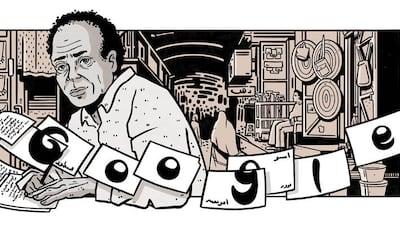Sudanese-Libyan writer Muhammed al-Fayturi is the subject of a Google Doodle, marking what would have been his 85th birthday.
Widely regarded as a pioneer of Arabic literature, the author's work comprised a fusion of mystic philosophy, African culture and calls for an oppression-free future.
Al-Fayturi was born in 1936, in Al Geneina, on the western border of Sudan. His father was Libyan, while his mother was Egyptian. At age 3, he moved to Egypt, where he spent his childhood.

He later studied literature and sciences, before becoming an editor for Sudanese and Egyptian newspapers.
He published his first collection of poems in 1956, with numerous plays, books and other poetry to follow, and making a living as a writer and journalist across Mena countries, including Sudan and Lebanon.
In 2015, his final two books were released. It's also the year he died, on May 24, in Rabat, Morocco.
Egyptian artist Nora Zeid, who is lives in Dubai, illustrated today's doodle. "I enjoy nudging people's perception of the status quo through my illustrations," she said in an interview with Google about the work. "Neocolonialist ideas have a great impact on how we perceive ourselves and our environment in Egypt and the region as a whole."
She said creating this doodle was "a dream project", but that it didn't come without concern "because I questioned whether or not I could do al-Fayturi's work justice through my illustration. His poetry tackles topics of racism and colonialism in the region, which are still relevant today."
Zeid took inspiration from the author's poetry for her illustration, describing his work as "extremely descriptive and vivid".
"The bustling market scene is a reflection of that. Additionally, I sensed it was sombre while still inspiring hope, hence the mix of emotion etched on his face."
Other Google Doodles from the Mena region:




























